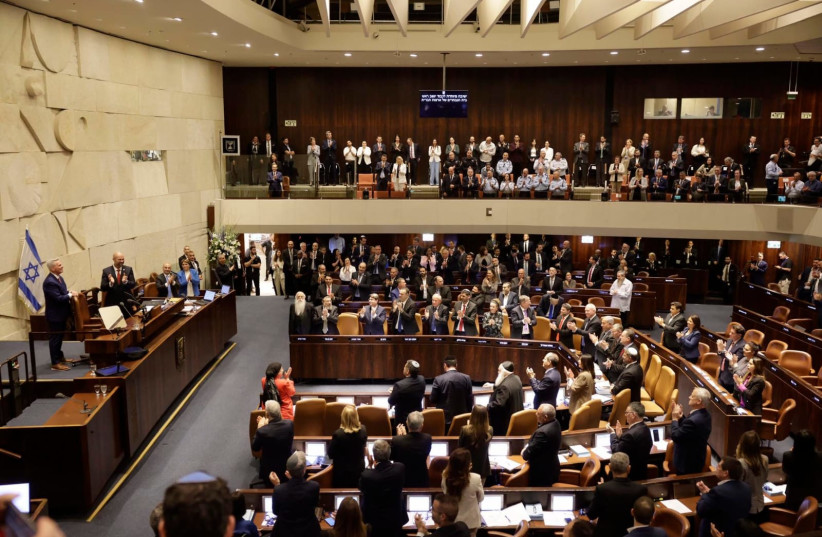Israel’s new budget is illegitimate, undemocratic, NGO petitions to High Court
The Knesset voted on Wednesday to approve the state budget for 2023 and 2024. While some are celebrating the stability such a move promises, others are criticizing the decision to pass a two-year budget as undemocratic.
The budget’s passage is seen as a triumph for Prime Minister Binyamin Netanyahu, who managed to overcome various coalition members’ budgetary demands and ultimatums.
The Knesset had a deadline to pass a state budget for 2023 by May 29. If the Knesset failed to pass a budget by that date, the government would have been dissolved and new elections would have been called. Although the requirement was only to pass a budget for the remainder of 2023, the Knesset passed a budget for 2024 as well.
Passing budget is one of the greatest obstacles faced by Israeli coalitions
Passing the state budget is one of the greatest obstacles faced by any Israeli coalition. As recently as 2020, the government fell due to an inability to pass a budget. The passage of a budget for 2024 as well as 2023, therefore, provides long-term stability for the coalition, but also has been criticized by some as illegitimate and undemocratic.
 Israel’s Knesset is seen listening to visiting US House of Representatives Speaker Kevin McCarthy as it reconvenes for its summer session, on May 1, 2023. (credit: MARC ISRAEL SELLEM/THE JERUSALEM POST)
Israel’s Knesset is seen listening to visiting US House of Representatives Speaker Kevin McCarthy as it reconvenes for its summer session, on May 1, 2023. (credit: MARC ISRAEL SELLEM/THE JERUSALEM POST)The Movement for Quality Government (MQG), an Israeli nonprofit devoted to promoting democracy and good governance, submitted a petition to the Supreme Court on Wednesday alleging that the biennial budget was illegal.
The petition drew on the precedent of a 2017 Supreme Court judgment that mandated a one-year budget because of the problems associated with budgets of more than one year. Israel first passed a two-year budget in 2009. In November 2021, the government passed a budget for December 2021 as well as all of 2022.
Ariel Barzilay, a lawyer and the head of MQG’s economic wing, told The Media Line that a biennial budget is problematic for two reasons. First, the longer-term budget reduces the Knesset’s ability to oversee government decisions. Israel also might be in a significantly different economic situation in 2024 if the proposed judicial reforms are passed, and the budget doesn’t take that into account, Barzilay said.
On the other hand, Yechiel Leiter, a public policy analyst, director-general of the Jerusalem Center for Public Affairs, and former chief of staff to Netanyahu at the Finance Ministry, told The Media Line that the two-year budget approval is a sign of government stability, which will have positive effects on Israel.
Senior Israeli economic consultant Alex Coman said that the nearly 998-billion-shekel ($269 billion) budget will not actually be implemented according to the bill that was passed. “We should understand that this budget is very far from what is actually going to happen,” he told The Media Line. He said that Netanyahu made numerous promises in order to appease his coalition partners, many of which he will be unable to follow through on.
“The revenue that the government is going to get is significantly lower than what they calculated,” he said. He explained that the budget is based on the assumption that the government will be able to bring in a large amount of revenue from taxes on high-tech companies. But the high-tech sector is “wounded and bleeding,” Coman said, and the government will likely get significantly lower tax revenue from the sector than it had expected.
The real estate sector, too, is struggling, and inflation is high, which will also affect the government’s ability to generate revenue, he said.
Leiter disputed that characterization, saying that the government should be able to bring in the expected revenue. “Budgets are generally implemented as they are passed,” he said, barring an unforeseen national emergency. He said that the high-tech sector is “doing quite well.”
Leiter also said that the money Netanyahu promised to specific parties in order to pass the budget was nothing new. In 1993, the government promised a large sum of money to the ultra-Orthodox Shas party in exchange for its support for the Oslo Accords, he said.
Barzilay, though, insisted that the budget’s earmarked funds were out of the ordinary.
“The last budget was about 1.5 billion shekels [$403 million] that was passed to specific parties, and now it’s 14 billion shekels [$3.8 billion]. It is a very big difference,” he said.





Comments are closed.